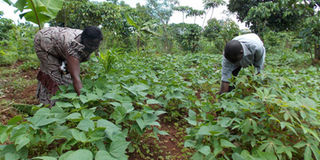Uganda’s biggest agricultural problems

Farmers in their garden. FILE PHOTO
What you need to know:
- Sweet potato weevil and virus infestation causes near total loss of about 98 per cent and national economic annual loss of US$ 6.7m.
- Long dry weather and poor soils are reducing rice production and the annual loss is estimated at US$ 6.2m.
Agriculture is the science of growing crops and rearing animals for food and income.
The sector, which is our biggest employer, is however faced with a number of challenges that need immediate attention.
They range from climate change, incurable crop diseases, a fast growing population, land fragmentation, and depleted soils among others.
Due to the onset of climate change some parts of the country experience abnormally long droughts resulting in disastrous crop failure and death of farmed animals.
The country is now host to pests and crop diseases that have no known cure and they are fast wiping out major food and cash crops such as banana, sweet potato, cassava, Irish potato, maize, and Robusta coffee among others.
Uganda is the largest producer of banana and sweet potato in Africa.
However, according to the Uganda Biosciences Information Centre (UBIC), the Banana Bacterial Wilt Disease causes loss of seven out of ten expected bunches and national annual economic loss of US$ 299.6m.
Sweet potato weevil and virus infestation causes near total loss of about 98 per cent and national economic annual loss of US$ 6.7m.
Late Blight disease has become resistant to herbicides and it is affecting six out of every ten potatoes yet the national demand for the crop in 2015 was up to 1,000,000 metric tonnes.
Cassava Brown Streak Disease and Cassava Mosaic are reducing cassava production and the country is producing a mere 6.7m tonnes annually compared to possible 30 million.
Long dry weather and poor soils are reducing rice production and the annual loss is estimated at US$ 6.2m. Due to drought and pests Ugandan farmers average maize yield is 2.7 tonnes per hectare compared to possible 9 tonnes. Writing in the Daily Monitor, October 9 2015, Dr Wilberforce Tushemeirwe of the National Agricultural Research Organisation (NARO) said there is no known solution to the problems other than the use of biotechnology.
For a country with a population of about 40m, of which 27 per cent live below the poverty line (UNHS 2017), and a Total Fertility Rate of 5.4 children, declining agricultural production portends danger.




